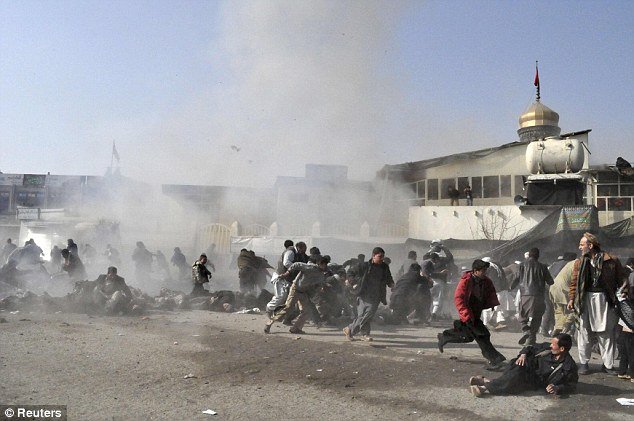
At least 54 people have been killed after a bomb exploded at a packed mosque in Afghanistan as people celebrated a major Shi’ite festival in Kabul.
Bodies lie strewn on the ground after the powerful bomb killed the people at a shrine by the river in Kabul’s old city.
People rush to the scene to help those injured in the blast, people who moments earlier had been praying and chanting with scores of other worshippers.
Another 4 people were killed and 17 injured after a bicycle bomb exploded near the main mosque in the northern city of Mazar-i-Sharif shortly afterwards.
One witness said the bomber was at the end of a line and detonated his explosives near one of the gates to the shrine.
Bodies of the dead lay on top of one another where they fell.

It was the single deadliest attack in Kabul for more than three years.
Religiously motivated attacks on Shi’ites are rare in Afghanistan, although they are common in neighbouring Pakistan.
No group has claimed responsibility for the attacks, reminiscent of the wave of sectarian violence that shook Iraq during the height of the war there.
The Ministry of Interior blamed the Taliban and “terrorists”. It said police had defused another bomb in Mazar-i-Sharif.
The Taliban strongly condemned the two attacks and said that they deeply regretted that innocent Afghans were killed and wounded.
Afghan President Hamid Karzai said it was unprecendented and the first time one had been carried out during a religious event.
The blasts happened in the middle of the Ashura festival – which marks the martyrdom of the Prophet Mohammad’s grandson Hussein in the battle of Karbala in Iraq in the year 680 – at around 7:30 a.m. GMT.
It is the biggest event in the Shi’ite calendar and features large processions that are vulnerable to militant attacks.
Afghanistan has a history of tension and violence between Sunnis and the Shi’ite minority, but since the fall of the Taliban the country had been spared the large scale sectarian attacks that have troubled neighbouring Pakistan.
Shi’ites account for some 20% of the population in predominantly Sunni Afghanistan. The Taliban insurgency has largely avoided fanning secretarian strife.
The bombing is one of the deadliest in the ten years of war since the Taliban regime was ousted.
It comes a day after a major international conference in Bonn, Germany, on the future of international involvement in Afghanistan.
President Hamid Karzai warned representatives of 85 nations at the conference that his country would need their financial support for at least another decade beyond the 2014 departure of international troops.
Hamid Karzai said: “Together we have spent blood and treasure in fighting terrorism.
“Your continued solidarity, your commitment and support will be crucial so that we can consolidate our gains and continue to address the challenges that remain.”
The conference was overshadowed by a display of bad blood between the U.S. and Pakistan – both of whom have a stake in making Afghanistan safe and solvent.
Pakistan boycotted the conference to protest after an errant U.S. air strike last month killed 24 soldiers along the border with Afghanistan.
Participating nations pledged their support for an inclusive Afghan-led reconciliation process on condition that any outcome must reject violence and terrorism and endorse the Afghan constitution and its guarantee of human rights.
[youtube obI-ekFOm2I]